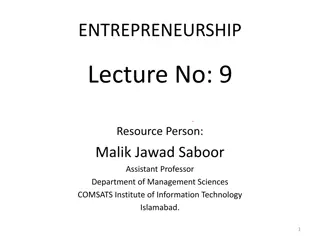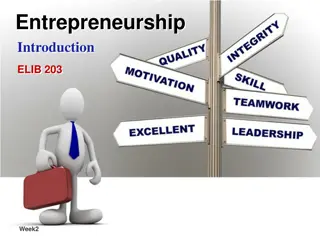Understanding Entrepreneurship: Key Concepts and Factors for Success
Dive into the world of entrepreneurship with insights on what it means to be an entrepreneur, the characteristics that define successful entrepreneurs, the importance of entrepreneurship for economic growth, and the factors contributing to entrepreneurial success. Learn about the difference between an entrepreneur and an intrapreneur, exploring how they operate within different contexts. Discover the essential skills and resources needed to thrive as an entrepreneur in a dynamic business environment.
Uploaded on Oct 05, 2024 | 0 Views
Download Presentation

Please find below an Image/Link to download the presentation.
The content on the website is provided AS IS for your information and personal use only. It may not be sold, licensed, or shared on other websites without obtaining consent from the author. Download presentation by click this link. If you encounter any issues during the download, it is possible that the publisher has removed the file from their server.
E N D
Presentation Transcript
Characteristics of Entrepreneurship Ability to take a risk Innovation Visionary and Leadership quality Open minded Flexibility Creativity Leadership Organization building
Importance of Entrepreneurship 1. Boosts economic activities 2. Provides balanced development 3. Improves the standard of living 4. Employment generation 5. Adds to the revenue 6. Earns foreign exchange
FACTORS CONTRIBUTING TO THE GROWTH OF ENTREPRENEURSHIP ECONOMIC FACTORS CULTURAL FACTORS POLITICAL FACTORS RESOURCE FACTORS ENTREPRENEURSHIP SKILLS Purchasing power Social Heritage Political stability Availability of resources Self- organization Recession Social class Motivational plans Seed capital Facing risks Subsistence economy Community based Business friendly legislations Availability of raw materials Management of business Disposable personal income Independence minded Clearance of hurdles Power and water supply Comprehensive business plans Availability of credit Higher returns Fighting corruption Essential services Determination to succeed
Entrepreneur V/S Intrapreneur Entrepreneur refers to a person who set up his own business with a new idea or concept. Intrapreneur refers to an employee of the organization who is in charge of undertaking innovations in product, service, process etc. Use resources provided by the company.
Entrepreneur V/S Intrapreneur BASIS FOR COMPARISON ENTREPRENEUR INTRAPRENEUR Meaning Entrepreneur refers to a person who set up his own business with a new idea or concept. Intrapreneur refers to an employee of the organization who is in charge of undertaking innovations in product, service, process etc. Resources Uses own resources. Use resources provided by the company. Capital Raised by him. Financed by the company. Enterprise Dependency Risk Newly established Independent Borne by the entrepreneur himself. An existing one Dependent Taken by the company. Works for Creating a leading position in the market. Change and renew the existing organizational system and culture.
OTHER CLASSIFICATION Innovating Entrepreneurs: Innovating entrepreneurs are one who introduce new goods, inaugurate new method of production, discover new market and reorganise the enterprise. Imitative Entrepreneurs: These are characterised by readiness to adopt successful innovations inaugurated by innovating entrepreneurs. Imitative entrepreneurs do not innovate the changes themselves, they only imitate techniques and technology innovated by others. Fabian Entrepreneurs: Traditional in their outlook. They liked to operate in secured markets Drone Entrepreneurs: They generally have a rigid outlook. They follow age-old practices
WOMEN ENTREPRENEURS https://theceostory.in/blog/top-10-famous-women-entrepreneurs-in-india/ Top ten women entrepreneurs in India Problems faced by women entrepreneurs in India Family responsibilities Judged on different roles Prejudiced attitude Sense of insecurity Limited opportunity Domestic conflicts Lack of finance
PROMOTION OF WOMEN ENTREPRENEURS 1. Education to all 2. Family involvement 3. Easy bank loans 4. Bank schemes:- e.g. SIDBI ( small industries development bank of India) introduced the Mahila Udyog Nidhi scheme , Bank of India , SBI- 5. Bhartiya Mahila Bank 6. Entrepreneurship development programme 7. Trade related Entrepreneurship assistance and development (TREAD) 8. Government schemes for women entrepreneurs: a. Annapurna scheme b. Stree Shakti package
8. Empowerment- SEWA ( Self Employed womens association) 9. Workshops and seminars 10. Training facilities 11. Work from Home
ENTREPRENEURSHIP TRAINING AND DEVELOPMENT CENTRES IN INDIA 1. National Institute for Entrepreneurship and Small Business development(NIESBUD) Apex body established by the GOI Responsible to coordinate and supervise the activities of the various institutions and agencies engaged in entrepreneurial development 2. Maharashtra Centre for Entrepreneurial development (MCED) training programmes for entrepreneurial development specially to small scale units 3. National Alliance of Young Entrepreneurs(NAYE) pioneer organization helping women entrepreneurs in many ways 4. National Small Industries Corporation ( NSIC) 1955 GOI enterprise specially for micro, small and medium enterprise
4. Institute for rural management and administration (IRMA) Located in Anand , Gujarat Offers two year course in rural development Trained in managerial skills
Incentives to Entrepreneurs in India 1. Credit linked Subsidy scheme 2. Exemption from excise duty 3. Marketing development assistance 4. Seed capital scheme 5. Tax holiday reduction in taxes 6. Taxation benefits























